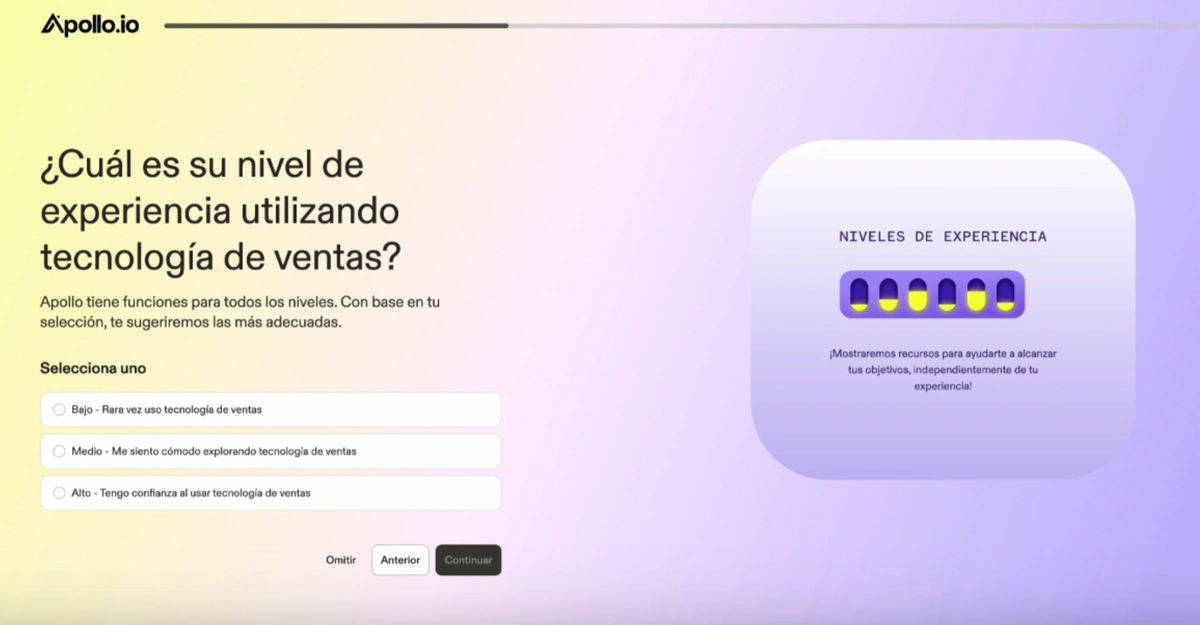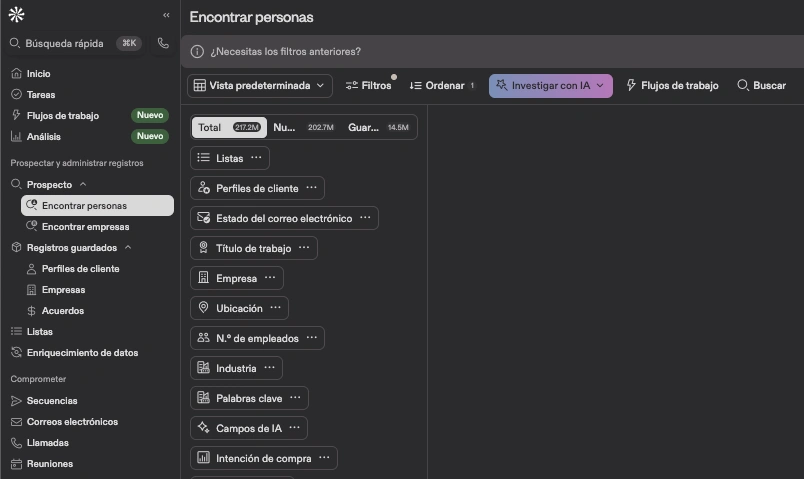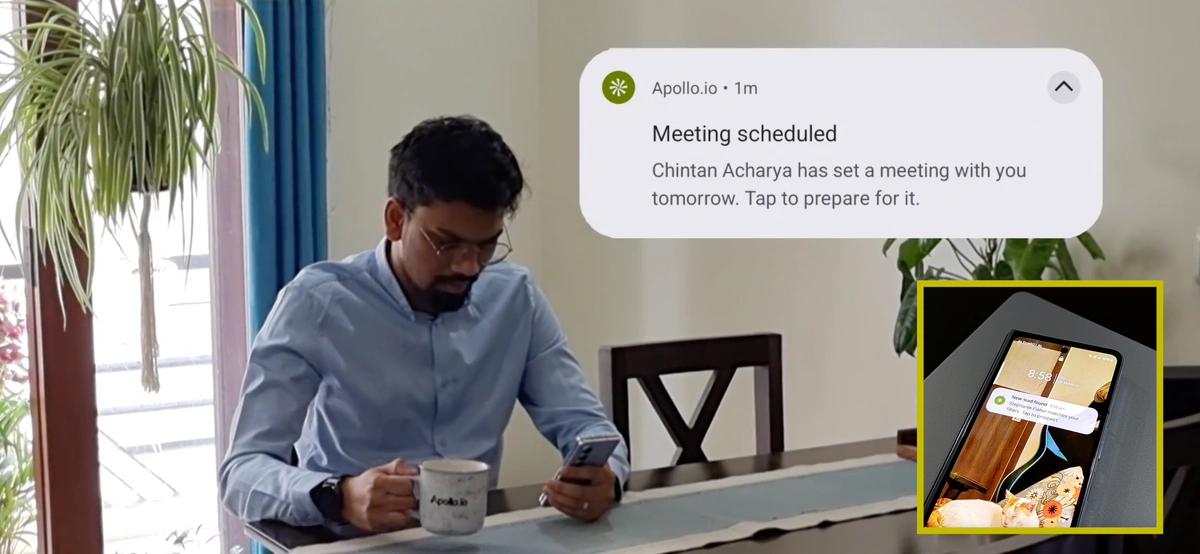🤖 A Hackathon with Purpose: Real AI, Real Impact
Earlier this month, Apollo hosted our largest and most ambitious hackathon to date: ApolloHacks 2025.
With 150+ participants forming 41 diverse teams, the energy and creativity were unmatched. This wasn’t just a company event — it was a launchpad for real innovation.
The theme for this year? AI-powered innovation for real-world sales workflows.
ApolloHacks 2025 challenged teams to build tools that would meaningfully improve how sales professionals work, especially SDRs, AEs, and RevOps teams. While AI was a major focus, participants were encouraged to solve any problem that matters — whether internal tooling, sales enablement, or global expansion.
This wasn’t a pitch-an-idea kind of event but a “build-first” hackathon, where teams were expected to deliver working prototypes — solutions that could be shipped with minimal polish.
In 2023, projects like Ask Apollo, Natural Language Search, Knowledge Base Search, and Email Analyzer all originated at ApolloHacks and have since become core features used by thousands of our customers every day.
🤝 Cross-Functional Teams Working as One
What stood out the most about ApolloHacks was its ability to unify the company. From engineers and designers to researchers and product managers — with the CEO and senior leadership diving straight into the coding and planning.
The outcome was rather impressive: well-oiled teams combining technical prowess with genuine user understanding. Whether you'd just joined or had years under your belt, ApolloHacks offered everyone a chance to create something worthwhile.
In the Part I of a 2 part blog, we will talk about two "standout" projects that reflect the spirit and impact of ApolloHacks 2025
🌍 One Code, Many Voices: The Global Sales Platform
Expanding Apollo's reach to non-English speaking markets presents a significant growth opportunity. True internationalization (i18n) is more than translation; it's a foundational re-architecture to handle diverse languages and cultural conventions. We didn't just aim for a quick fix; we prototyped core infrastructure for a scalable, global Apollo, focusing on smart tooling and robust design principles. Our long-term goal was to efficiently build a "Reusable i18n Framework".
In this post, we'll touch upon the core technical achievements that made this possible:
- Automated String Externalization: Identifying translatable strings across our Ruby on Rails backend and React frontend was a huge first step. We leveraged AST (Abstract Syntax Tree) parsers and custom scripts to analyze code and flag hardcoded strings. This was crucial for preparing them for i18n libraries like FormatJS (
react-intl) on the frontend andrails-i18non the backend. - Establishing Core i18n Patterns:
- Frontend: A significant portion of the 380+ files touched for the MVP involved adapting frontend components for dynamic content. This included prototyping patterns like refactoring constants into functions accepting an "intl" object (from
react-intl) or changing static strings todefineMessagecalls. We also established conventions for organizing message definitions (e.g., ComponentName.messages.ts) for key UI flows. - Backend: For the backend, we focused on integrating
rails-i18nand ensuring locale information could be passed and utilized for simple string lookups. We explored basic helper methods to streamline access to translations within request contexts for the MVP scope, illustrating the need for more structured locale management.
- Frontend: A significant portion of the 380+ files touched for the MVP involved adapting frontend components for dynamic content. This included prototyping patterns like refactoring constants into functions accepting an "intl" object (from
- AI-Powered Initial Translation: To quickly stand up a Spanish MVP, we utilized AI tooling (Google Translate API, Cursor AI) for an initial pass on UI string translations and keyword generation (e.g., "VP de Ventas") for the selected user journeys.
- TMS & Workflow Preparation: We demonstrated foresight by developing scripts to extract messages into standard formats (e.g., JSON). We also explored initial CLI-based integration concepts with a Translation Management System (Phrase Strings), outlining a path for a future AI-assisted, human-reviewed localization pipeline.
- Built-in QA Support: A simple but effective "test" locale (e.g., :test) was implemented. This displayed translation keys instead of text, allowing us to easily verify correct i18n key usage during development and QA of the MVP.
The Outcome: Apollo In Spanish & A Blueprint For Scale
The Hackathon culminated in a functional Spanish MVP covering key user journeys like login, onboarding, and People Search. This successfully validated the core technical approach and the AI-assisted content generation for rapid initial localization. More importantly, it highlighted critical architectural considerations for a production system, such as the need for robust mechanisms to maintain backend contract integrity (e.g., not overwriting original English data in the DB with translated strings) and ensuring full Unicode (UTF-8) support.
The learnings and prototypes from the Hackathon now directly inform the ongoing production effort, which includes building out more sophisticated backend abstractions (like dedicated Locale context and helper classes), comprehensive Rake tasks for code generation, and full TMS integration.
This foundational i18n work, driven by a collaborative team from Poland (Veronika, Mikolaj), India (Vinayak, Keshav, Praveen), and the USA (Echo), has provided a critical launchpad for making Apollo a truly global platform.
📱 Mobile Mob: Apollo in Your Pocket
Sales teams are increasingly mobile — their tools should be too! This team worked on bringing Apollo’s powerful features to a mobile-first experience, enabling reps to access data, update leads, and stay productive from anywhere.
With this project, the future of Apollo is not just responsive — it's truly on the go.
We built a mobile app that combines features from Apollo’s Chrome extension for prospecting, with our Omnisearch from the web app. Omnisearch allows you to search for any person or company on Apollo. The result is a mobile-first experience that’s tailored to the functionality a Sales Rep needs while they are on the move. You can search, add to lists, add to sequences, send emails, make phone calls, look at your upcoming meetings, receive notifications, and more — all from the Apollo mobile app.
Under the hood, we forked our primary web app to create a leaner, mobile-specific version. This new web app reuses layouts from our Chrome extension, as our Chrome extension UI is better suited for narrow viewports, such as mobile phones.
To package the mobile experience into a native app, we opted for Capacitor — a cross-platform native runtime for web apps. Capacitor allows us to present the mobile app as a fully-native app while using the same UI components as our web app and Chrome extension. This cut down iteration time significantly, as we did not have to reinvent the wheel.
While Capacitor solved our problems, it introduced some too:
-
Apollo's OAuth login flow does not work out-of-the-box with Capacitor, as the WebView in Capacitor had its context isolated leading to our OAuth flow taking the user out of Capacitor. A solution would have been to use something native, but that would have required significant changes to our backend.
These efforts weren't justified for an MVP. We solved this by making minimal changes to our backend and building popup-like flows with System WebViews.
-
We use Customer.io for communicating with our users. While Customer.io did have Android, iOS, and even React Native SDKs, it didn't have an SDK for Capacitor. This meant that we needed to separately integrate both Android and iOS SDKS. Who knows, maybe we'll get a Customer.io Capacitor SDK out of this?
The narrow feature set of the Apollo mobile app makes it much lighter to use and is use-case specific: it’s your mobile companion. It does not aim to replace the web app, but rather augment your use of Apollo.
We plan to integrate Twilio’s SDK to power Dialer for the mobile app. This will allow users to receive incoming calls directly on their mobile phones instead of requiring them to use Apollo from their computers to receive calls. Kudos to Umang, Chintan, Vinay, Cyrez, Sourabh, Pavel, Kate, and Aditya—their cross-team effort made it possible!
🔮 Looking Ahead - Join Us At Apollo!
ApolloHacks isn’t just an event — it’s a reflection of how we build. We believe the best product ideas come from those closest to the problems, and when we empower our teams to solve them creatively, the results speak for themselves. To everyone who made ApolloHacks possible — the builders, the organizers, the mentors, and the judges — thank you.
From AI innovation to global scale, ApolloHacks 2025 pushed boundaries and delivered solutions that will shape the future of sales technology. Stay tuned for part II of the post on ApolloHacks!
We would love for smart engineers like you to join our "fully remote, globally distributed" team. Click here to apply now!



